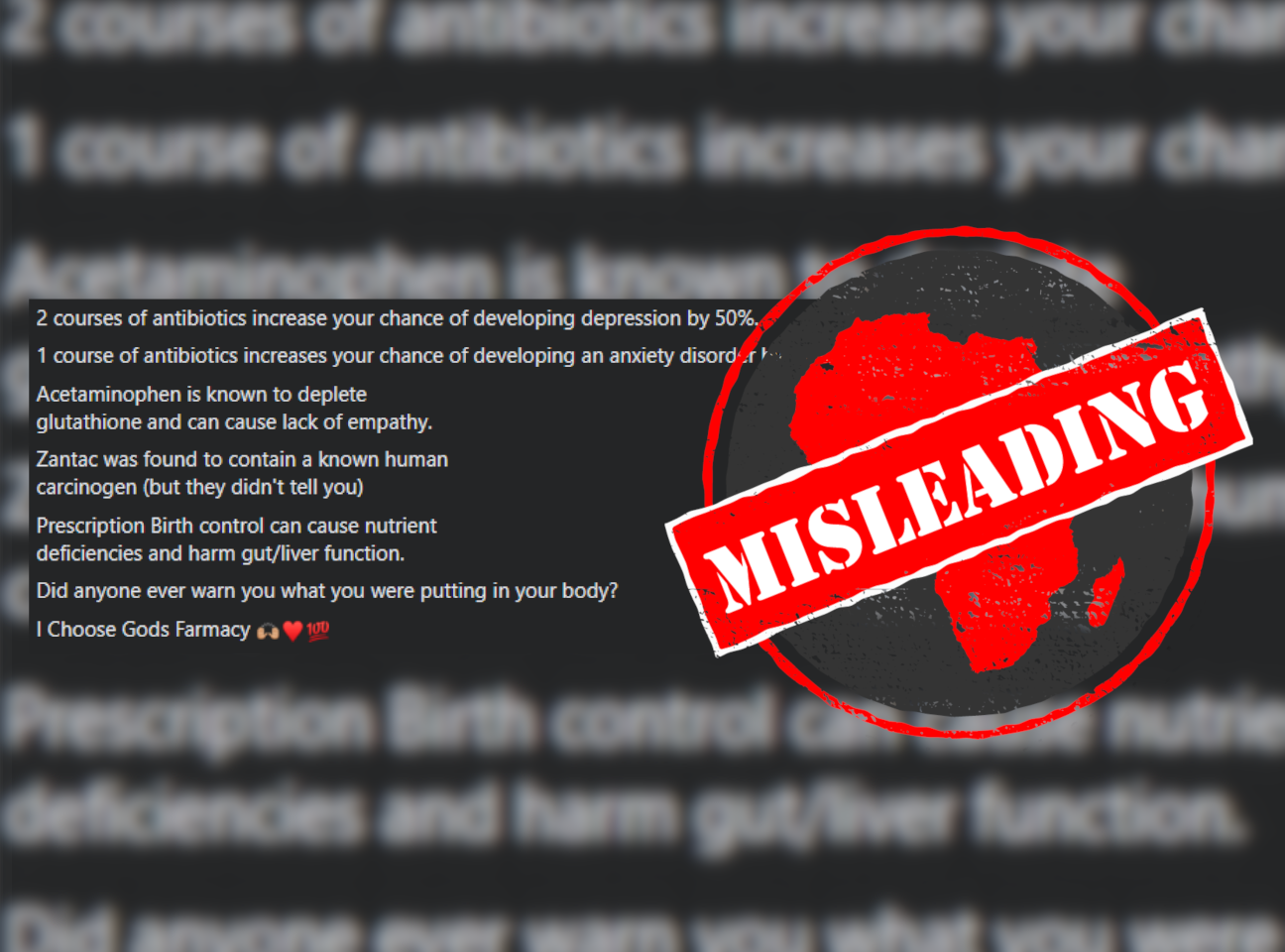IN SHORT: A widely shared message warns of the hidden dangers of various medications. But while there’s a grain of truth here, antibiotics and other medicines aren’t as dangerous as it suggests. Ask a doctor if you are worried about taking a particular drug.
A message that has been copied and shared dozens of times on Facebook makes several unsubstantiated claims about the side-effects of antibiotics and other medications.
Antibiotics are chemicals that are harmful to microorganisms, and are used in medicine to kill disease-producing organisms like bacteria. Modern antibiotic use began in 1910 and was a breakthrough moment in the history of medicine. As one scientific paper puts it, antibiotics are “among our most transformative medicines, irrevocably changing how we die and how we live”, and have contributed to decade-long increases in human life expectancy.
The messages shared on social media suggest that this comes with major drawbacks. One version claims that “2 courses of antibiotics increase your chance of developing depression by 50%” and that “1 course of antibiotics increases your chance of developing an anxiety disorder by 17%”.
The available data suggest a more complex story. Here’s why.

Some truth to these claims
The messages don’t cite any sources for these claims, which is often a red flag in health-related claims made on social media. But there is some evidence of a link between antibiotics and psychiatric disorders like depression and anxiety.
The leading theory behind this link is that antibiotics disrupt what is called the microbiome in the human digestive tract. The microbiome is the term for all of the microorganisms which live on and in humans. While some microorganisms cause disease, there is growing evidence that the microbiome is not just beneficial but vital to human health.
As Harvard University’s school of public health explains here, the organisms of the microbiome strengthen the immune system, break down toxic compounds and produce vital nutrients. The microbiome is sometimes even called a “supporting organ” because of its importance in the human body.
There is also evidence that microorganisms in the digestive tract can influence, and be influenced by, the brain, in what is referred to as the gut-brain axis. This has led to the gut microbiome being linked to a number of conditions, including addiction, anxiety, stress, neurodegenerative disorders, epilepsy and more.
Many antibiotics have what are called “off-target” effects, also affecting bacteria that do not cause disease. This is how they are thought to be linked to diseases such as depression and anxiety: antibiotics disrupt the gut microbiome, which in turn has an effect on the brain and other areas of the body.
However, not all antibiotics have these effects, and they don’t all have the same effects. And with an increased understanding of how antibiotics may disrupt the microbiome, has come an understanding of how to counteract those effects.
This is one of the reasons why these Facebook messages are misleading.
Not all antibiotics have the same side-effects, and impacts vary
The first issue with these claims is that not all antibiotics work in the same way or have the same side effects. Not all are linked to depression and anxiety, and some antibiotics even have antidepressant effects – likely also related to their impact on the gut-brain axis. The social media posts mislead readers by omitting that not all antibiotic use is associated with depression and anxiety, and overstating the risks of those that are.
Some versions of the message ask “Did anyone ever warn of these risks??” to which the answer is “yes”. The messages like this are trying to scare-monger, when this information is, in fact, widely available. Not only has research on potential links between depression and antibiotic use been published in scientific journals and reported on by news outlets but particular drugs make it clear when these conditions are known side-effects.
For example, the antibiotic levofloxacin was one of the first to be associated with antibiotic-induced depression. Patient information leaflets for medications which include levofloxacin warn of this side effect. This leaflet, for example, warns that depression is one of a number of “very rare but serious side effects”. It advises that if patients experience these side effects of the medication, they contact their doctor immediately before continuing to use the medication.
Other levofloxacin products also warn that depression is a known, although rare, side effect.
Africa Check could not find sources which matched the message’s claims about specific risk increases due to antibiotic use, such as a 50% increase in risk of depression after two courses of antibiotics. But even if these figures are real, they may not be as dramatic as the message suggests.
Understanding what ‘risk’ means
It is important to make the distinction between relative risk, or the amount by which a risk is increased or decreased compared to the original risk, and absolute risk, or the actual risk of an event. Confusing the two is a common statistical error which sometimes leads to overestimating risk.
For example, if an event has an associated absolute risk of 1%, but something doubles this chance – a 100% relative risk increase – the new absolute risk is only 2%.
In this case, the increases quoted are increases in relative risk. Even if the numbers were accurate, the absolute risk of contracting depression may still be minor. It’s not possible to know without at least also knowing the absolute risk, which the social media posts omit.
If you are unsure about the side effects or safety of a particular medication, ask your doctor for more information about whether it is safe for you.
Other claims also overstated or incorrect
The messages include other warnings, including the claim that “Zantac was found to contain a known human carcinogen (but they didn't tell you)”. Carcinogens are cancer-causing substances or agents.
Zantac is a brand name of the heartburn medication ranitidine. It was recalled in October 2019 by a number of manufacturers after their products were found to contain a carcinogen.
In the following years, ranitidine was withdrawn entirely from various markets following research that linked it to increased risk of cancer. In July 2021, the UK’s National Health Service wrote: “Ranitidine is not currently available in the UK or globally. It has been discontinued as a precaution because it may contain a small amount of an impurity that has been linked to an increased risk of cancer in animals. It's not yet known whether it will be available again in future.”
It is incorrect to claim that “they didn’t tell you” about this recall, as products were withdrawn immediately after the impurity was discovered. Regulatory warnings and news reports about the recall have been widely publicly available.
Like the warnings about antibiotics, this claim dramatically overstates the risks associated with common medications. As we have written about false anti-vaccine claims, misleading claims like these are dangerous, in part because they encourage fear and doubt about safe and effective medications.
Before acting on claims like these, ask a doctor about the safety of a particular medication.
Republish our content for free
For publishers: what to do if your post is rated false
A fact-checker has rated your Facebook or Instagram post as “false”, “altered”, “partly false” or “missing context”. This could have serious consequences. What do you do?
Click on our guide for the steps you should follow.
Publishers guideAfrica Check teams up with Facebook
Africa Check is a partner in Meta's third-party fact-checking programme to help stop the spread of false information on social media.
The content we rate as “false” will be downgraded on Facebook and Instagram. This means fewer people will see it.
You can also help identify false information on Facebook. This guide explains how.



Add new comment